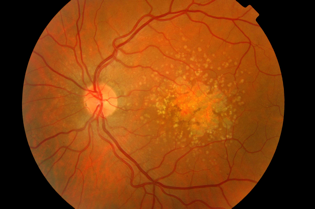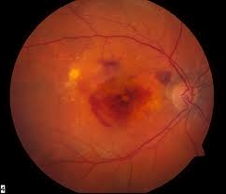What is Age Related Macular Degeneration?
Age-related macular degeneration (AMD) is a type of vision loss where there is a distortion or absence of the central field of vision. Peripheral (side) vision is usually not affected. AMD does not tend to cause complete blindness.
AMD is most prevalent in people aged 40 years and over, with about one in seven showing signs of AMD. The two different types of AMD are called ‘wet’ and ‘dry’. Dry AMD accounts for about 90 per cent of cases. There is no cure for dry AMD. Treatment includes: monitoring with your ophthalmologist, a healthy diet, nutritional supplements and occupational therapy to help the person adapt to vision loss.
Dry AMD
Early signs of dry AMD can be normal for ageing, and can have very mild symptoms, that improve with enhanced lighting. With advancing years, worsening of dry AMD disease causes an increase in symptoms, and can be a risk factor for wet AMD (see below).
The light-sensitive cells in the macula (centre of the visual field) gradually break down and this causes blurry vision in the centre of the affected eye. Vision loss tends to occur slowly over time. While doctors don’t know what causes the macula to atrophy, the condition tends to run in families, which suggests that genetics may play an important role.
Wet AMD
In wet AMD, abnormal growth of blood vessels leads to leakage of fluid and blood below the macula. This results in damage to the retina and in turn leads to the destruction of the light-sensitive cells that make up the macula. The blood vessels may also grow across the retina. Vision loss tends to be sudden and dramatic. Wet AMD tends to cause more severe vision loss than dry AMD.
Symptoms of AMD
Most people lead normal lives and in its earlier stages, AMD does not cause any symptoms. In the later stages of AMD, symptoms depend on the type and severity of the condition. Generally speaking, common symptoms of AMD may include:
- Problems with close work such as reading and sewing
- Distorted central vision (for example, straight lines look wavy)
- Blurred central vision
- Blank or dark spots
- Complete loss of central vision
- Rapid loss of vision with Wet AMD
For an assessment please contact us to make an appointment with one of the Ophthalmologists please click on the I’m a Patient link, or call us on 07 3283 3488 to discuss the steps and cost for further diagnosis.
Treatment
The two treatments for Age-Related Macular Degeneration (WET) are Laser Treatment (performed in our clinics) or Anti-VEGF injections performed in our clinics and/or in the Moreton Day Hospital in our IVI Clinics (Intravenous Injection).
 Moreton Day Hospital – Our close working relationship with this state of the art facility means that your journey will be seamless from clinic to hospital, ensuring the best medical outcome for your treatment. For more information on the Moreton Day Hospital and this procedure, including costs, please visit the website or call the friendly staff on 07 3487 1111.
Moreton Day Hospital – Our close working relationship with this state of the art facility means that your journey will be seamless from clinic to hospital, ensuring the best medical outcome for your treatment. For more information on the Moreton Day Hospital and this procedure, including costs, please visit the website or call the friendly staff on 07 3487 1111.
For more information on Age-related Macular Degeneration (AMD) please refer to the following organisations.
https://www.mdfoundation.com.au/
https://www.visionaustralia.org/information/eye-conditions/Aged-Related-Macular-Degeneration
https://www.betterhealth.vic.gov.au/health/conditionsandtreatments/age-related-macular-degeneration


